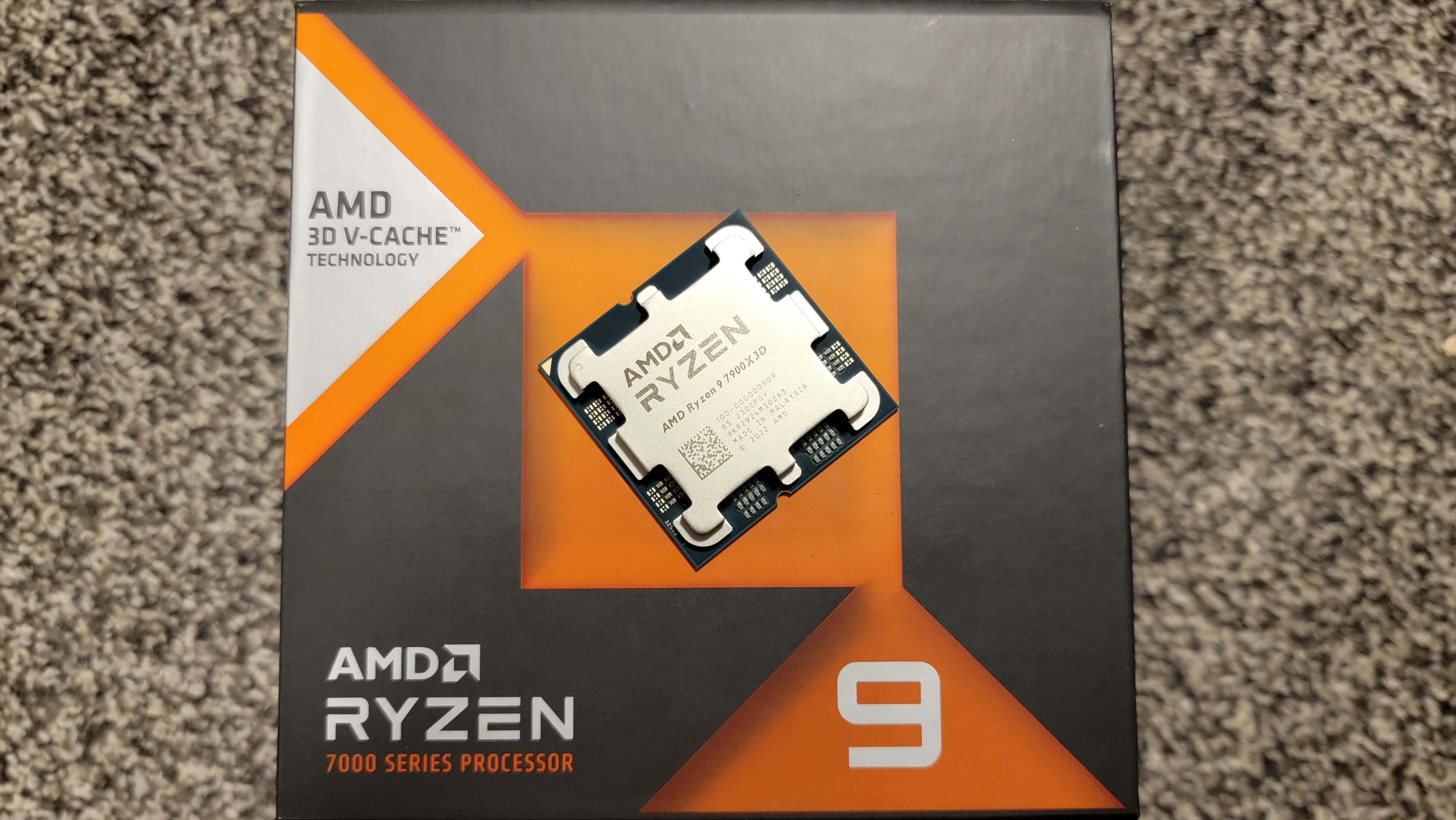Why you can trust Tom's Hardware
The $599 Ryzen 9 7900X3D leverages AMD's 3D V-Cache technology to deliver incredible gaming performance, but its unreasonably high pricing leaves it vulnerable to stiff competition from both higher- and lower-cost chips. As we've seen with the other 3D V-Cache-equipped chips, the 7900X3D also suffers from lower performance in productivity applications than its standard counterpart — in this case, the Ryzen 9 7900X, but that's harder to swallow with the higher price tag.
Below, we have the geometric mean of our gaming test suite at 1080p and 1440p and a cumulative measure of performance in single- and multi-threaded applications. We conducted our gaming tests with an Nvidia RTX 4090, so performance deltas will shrink with lesser cards and higher resolution and fidelity settings.
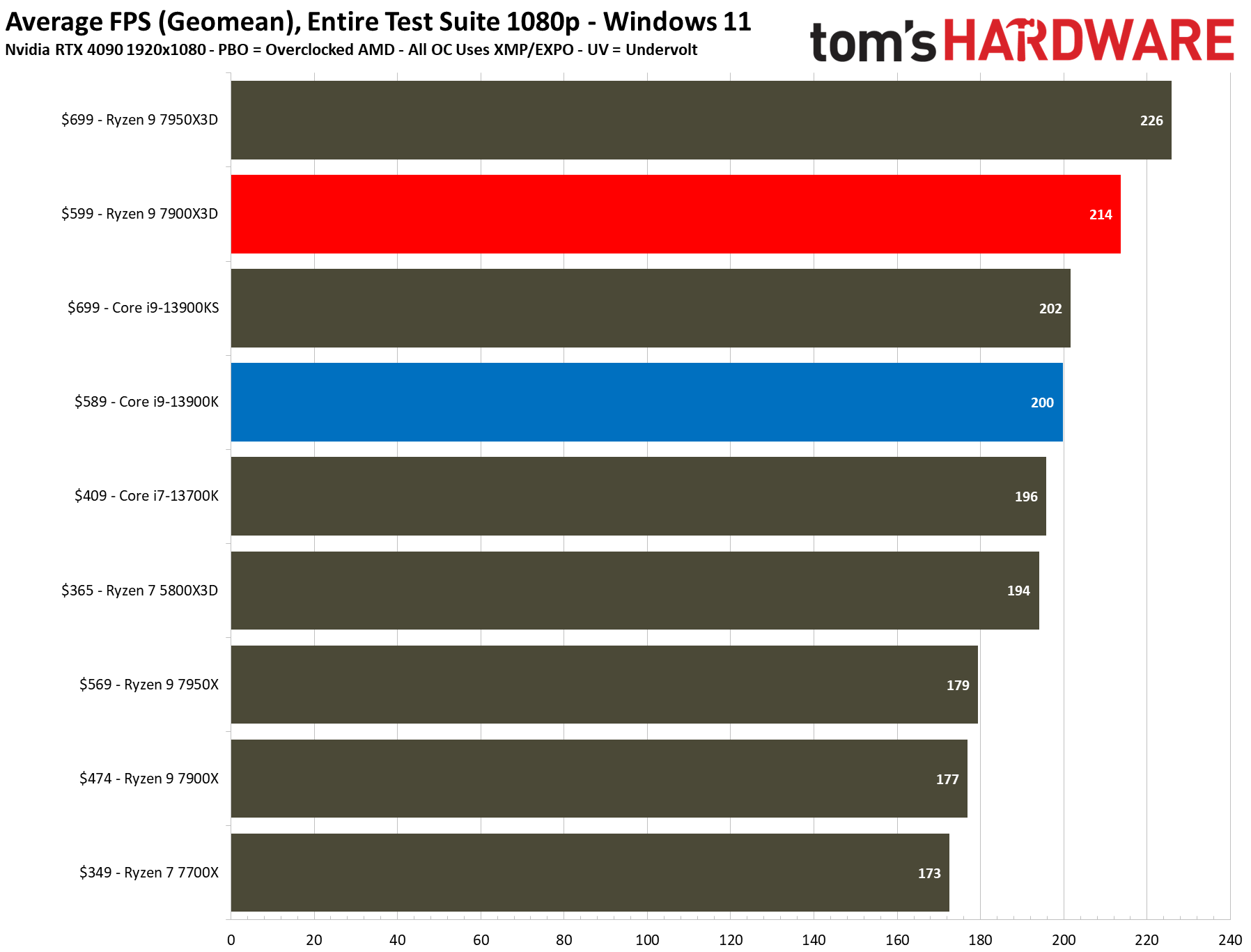
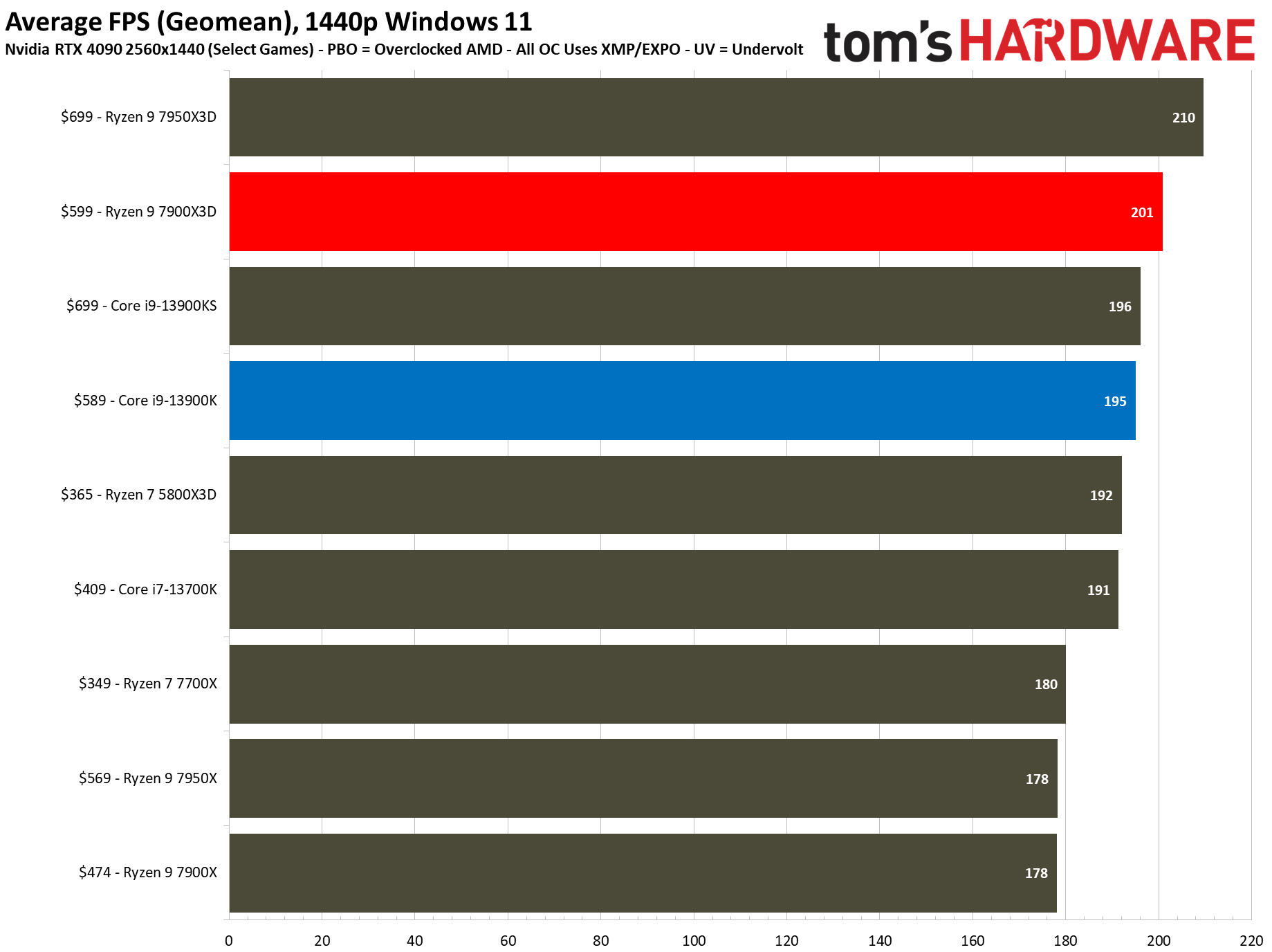
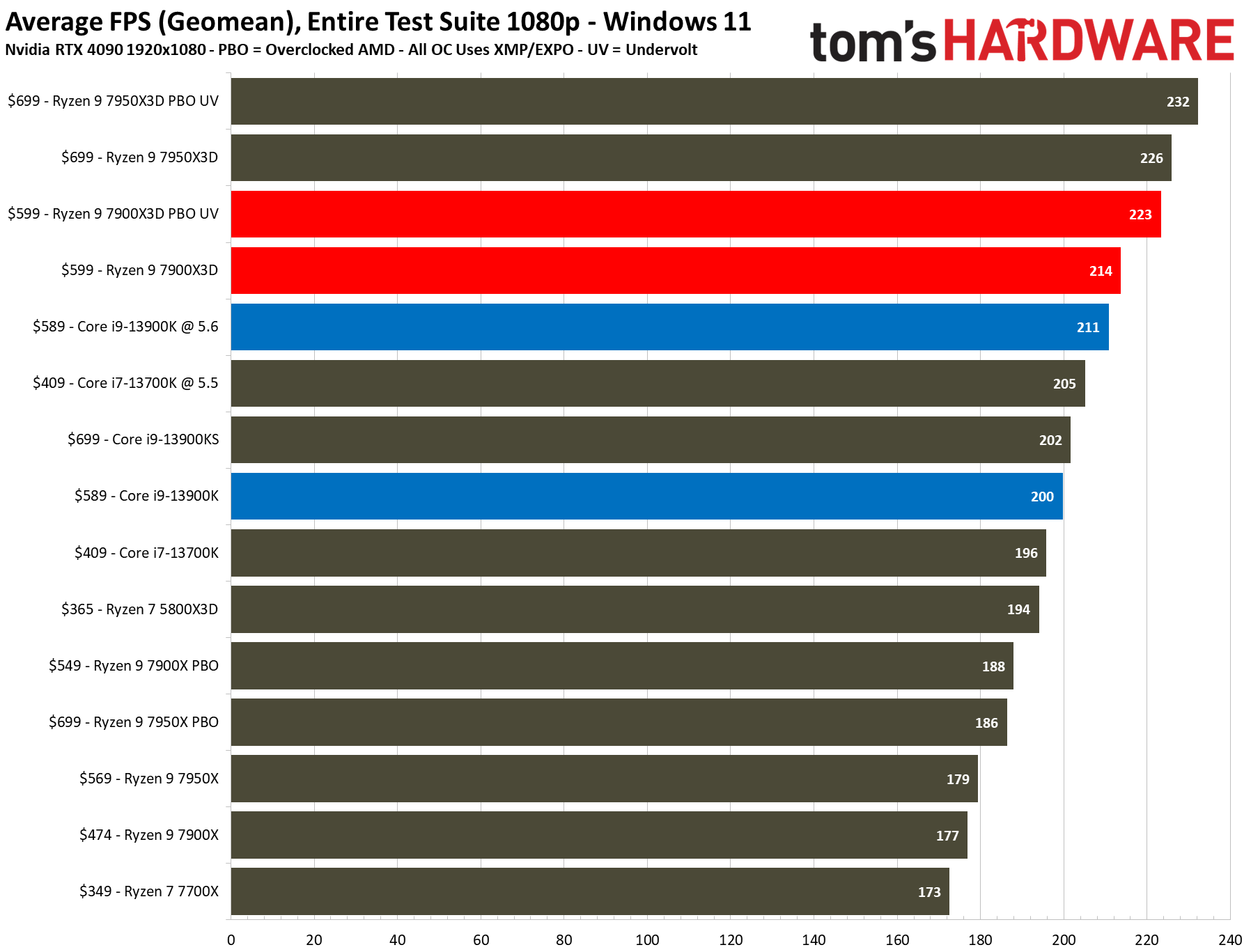
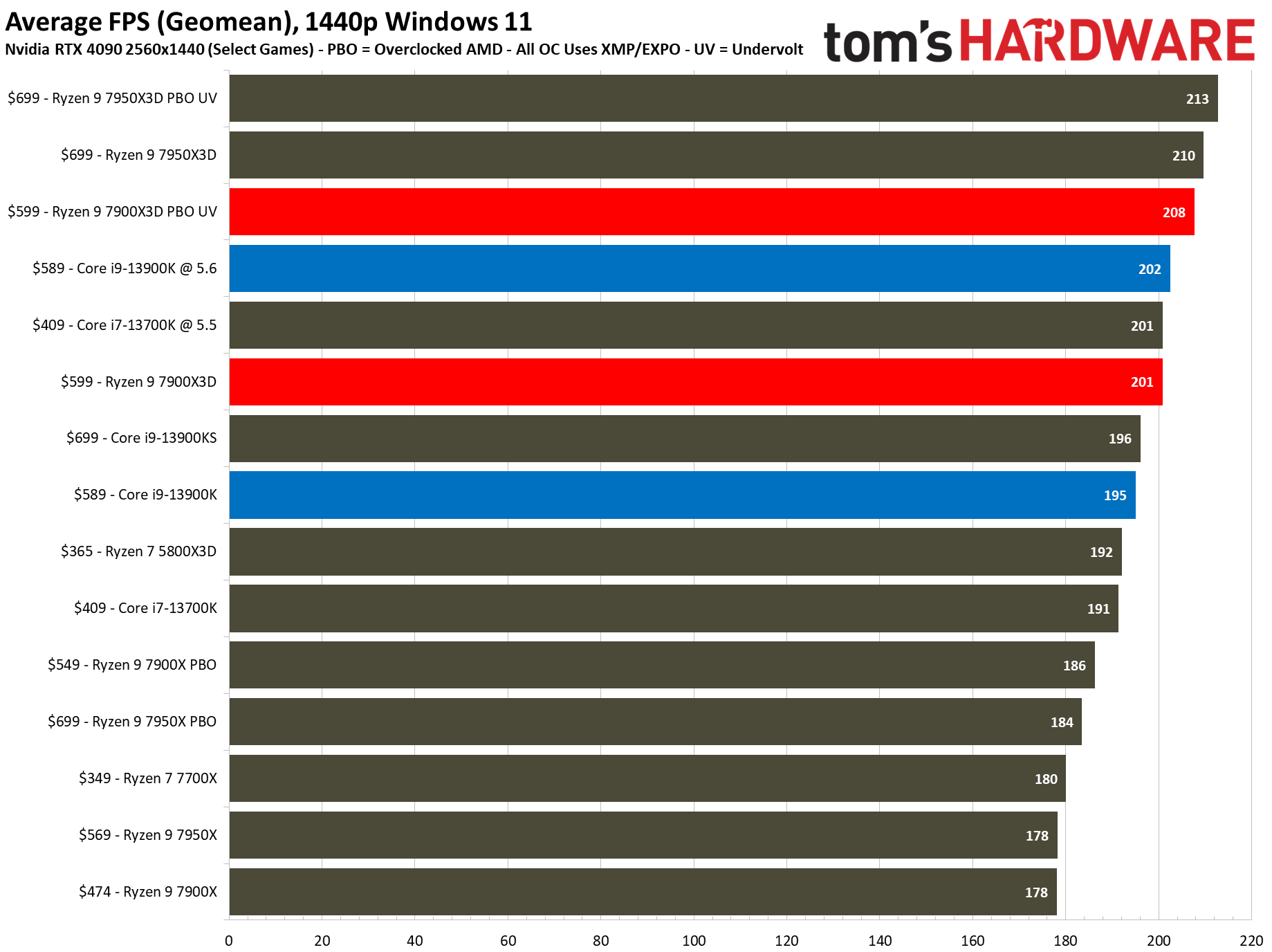
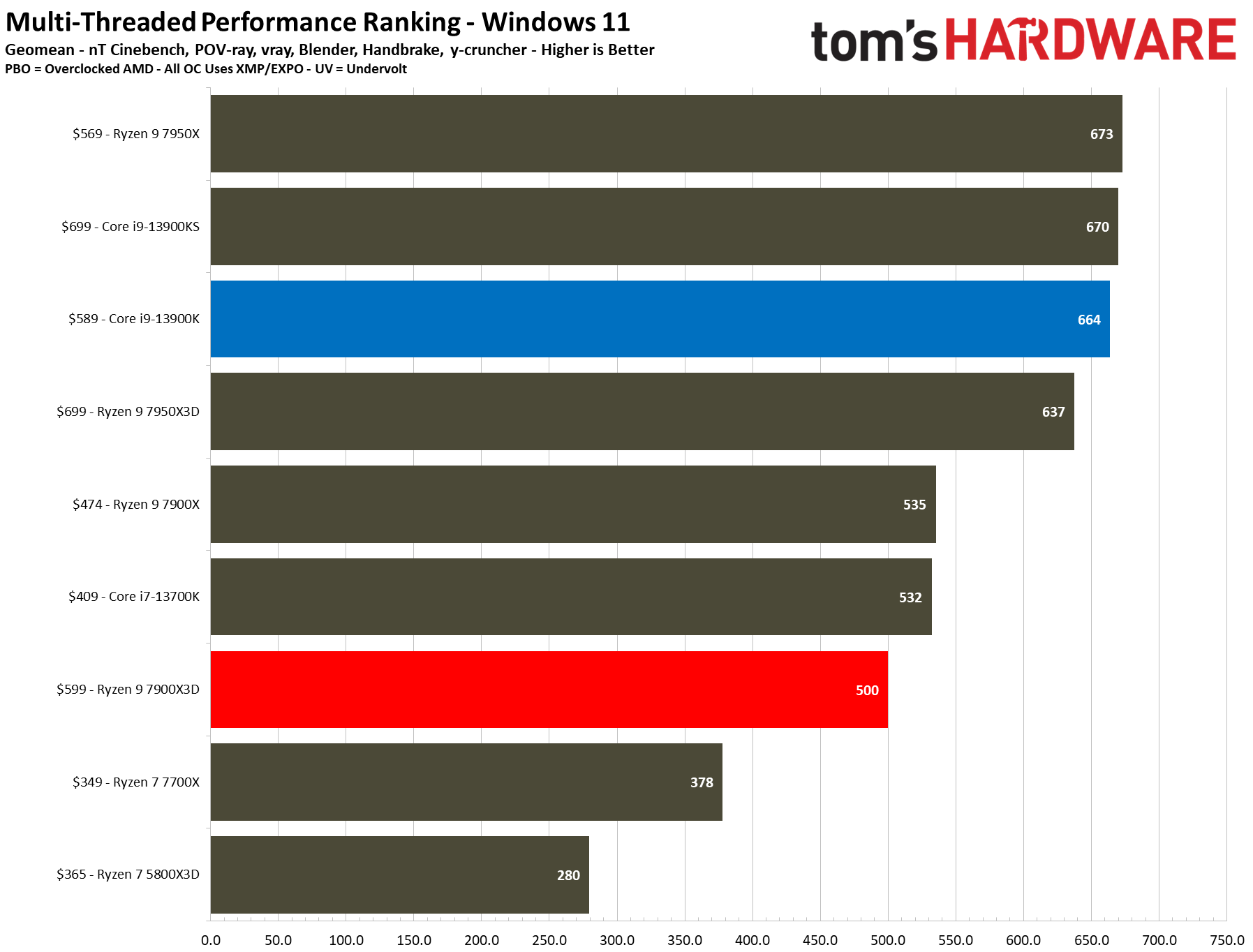
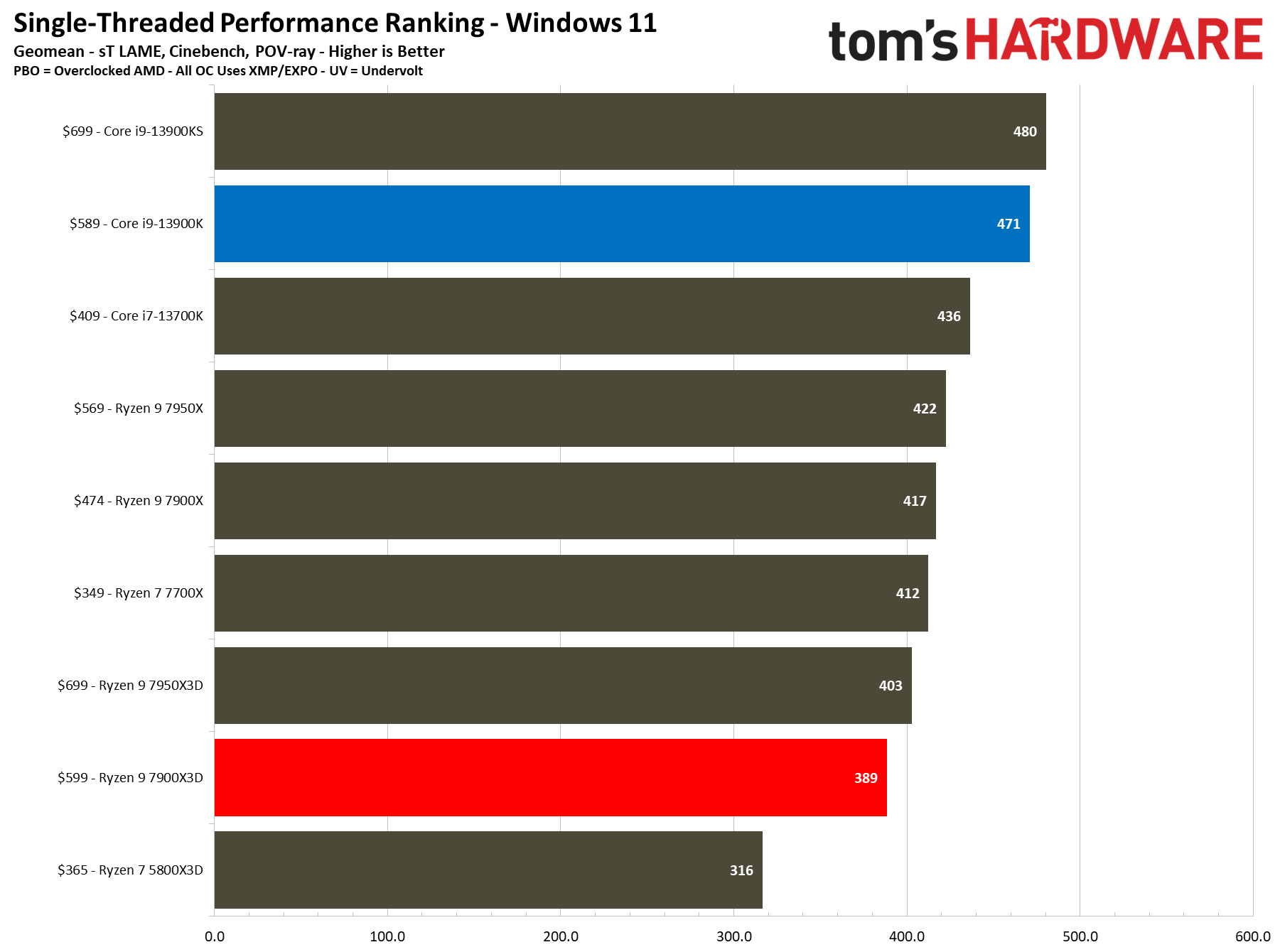
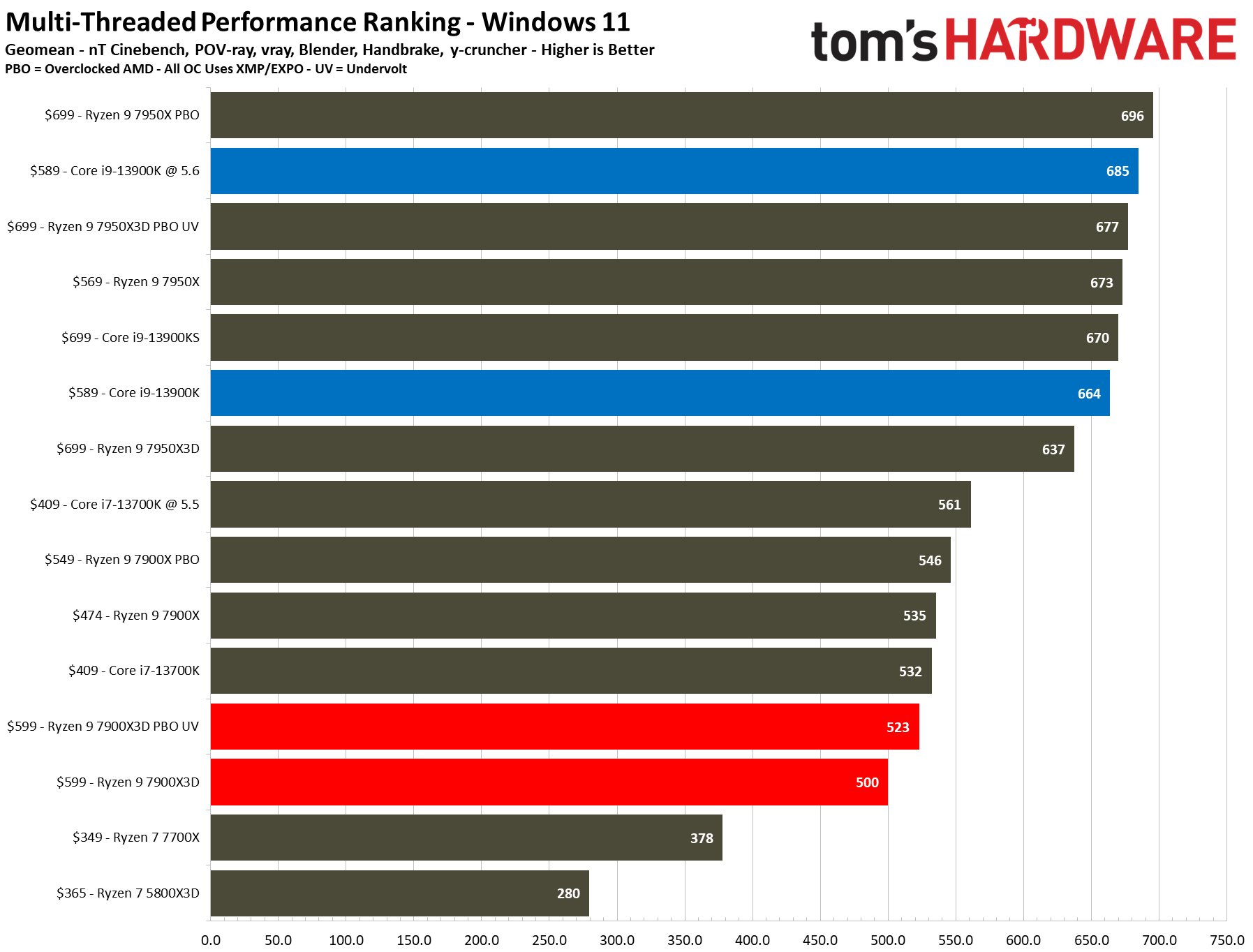
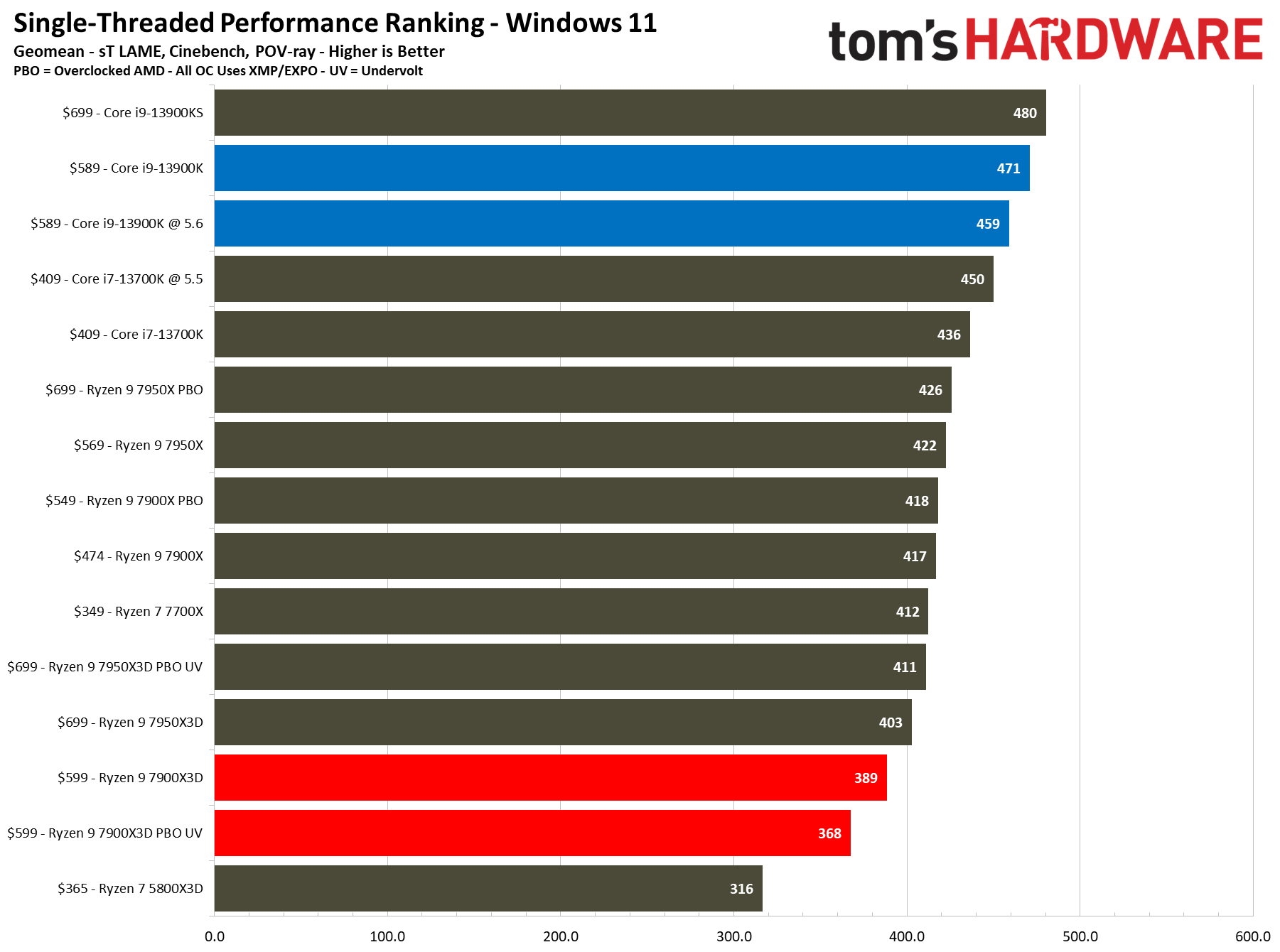
The first slides are simplified by excluding the overclocking configs, while the remainder contain the full roster of tested configurations. These are cumulative measurements, though, and the 3D V-Cache doesn’t accelerate all titles equally — you’ll need to check our individual game benchmarks on the preceding pages to make an informed decision based on your workload.
The $699 Ryzen 9 7950X3D is ~7% faster than the $589 Core i9-13900K in 1080p gaming at stock and overclocked settings, and it beats the much less expensive $409 Core i7-13700K by 9%. However, these chips offer superior performance in productivity applications, offsetting the gaming advantage for those seeking a more well-rounded solution. For similar pricing, the 13900K is 21% faster than the Ryzen 9 7900X3D in single-threaded work and 32% faster in threaded applications. You could also step down a pricing tier to the less expensive 13700K — it's 6% faster in multi-threaded and 12% faster in single-threaded than the 7900X3D.
The $699 16-core Ryzen 9 7950X3D is by far the 7900X3D's biggest competition — the flagship is 6% faster in gaming than the 12-core 7900X3D at stock settings and 4% faster after overclocking. However, it also comes with four additional cores that help reduce the shortcomings in productivity applications; the 7950X3D is 27% faster in threaded work and 4% faster in single-threaded applications.
There's a $100 price difference (15%) between the Ryzen 9 7950X3D and Ryzen 9 7900X3D, and given the high pricing of a leading-edge rig that will house this class of processor, most should step up to the 7950X3D. For instance, the extra $100 would add roughly 3% or less to the cost of a $3,000 to $4,000+ system suitable for this class of chip. Given the sizeable improvement in both gaming and application performance with the 7950X3D, most should spend that comparatively little extra cash to step up.
The Ryzen 9 7900X3D is incredibly power efficient, drawing far less power than either the standard 7900X or the competing Intel chips, thus delivering superb power efficiency that ranks among the best we’ve ever tested. That means you’ll ultimately benefit from a cooler, quieter system. The chip also drops into AM5 motherboards that support the latest connectivity tech, like PCIe 5.0 and DDR5, and AMD plans to support the platform until 2025+. In contrast, Intel’s current round of motherboards will only support one more generation of chips, so upgradeability remains an advantage for AMD.
Overall, AMD has done an outstanding job in bringing thermals under control well enough to deliver high core count chips with 3D-stacking tech that provides excellent performance within an acceptable TDP threshold. The driver implementation also works well to automatically optimize the system for different usages on the fly while also leaving plenty of room for end-user configuration.
However, much like we saw with the Ryzen 9 7900X, the 7900X3D's pricing is the fly in the ointment. It might also be why AMD didn't sample this chip to the press. Most dedicated gamers aren’t interested in a $599 processor for gaming only, and we certainly don't recommend spending this much if that's your only goal. Instead, you should wait for the eight-core $449 Ryzen 7 7800X3D that will likely offer nearly the same amount of gaming performance when it arrives in April.
Given that the Ryzen 9 7900X3D is designed to be really good at one thing, gaming, while accepting trade-offs in others, it has to excel in such a way that other options aren't worthy of consideration. The Ryzen 9 7900X3D doesn't quite meet that bar and has tremendous pressure from both lower- and higher-end Ryzen models, like the Ryzen 9 7950X3D, while also facing value competition from Intel's chips, leaving little room for success at its current pricing. We expect this chip to see big price reductions over the coming months, but until then, it's better to seek other alternatives.
- MORE: Best CPU for gaming
- MORE: CPU Benchmark Hierarchy
- MORE: Intel vs AMD
- MORE: How to Overclock a CPU
Get Tom's Hardware's best news and in-depth reviews, straight to your inbox.
Current page: Challengers On All Sides
Prev Page AMD Ryzen 9 7900X3D Productivity Benchmarks
Paul Alcorn is the Editor-in-Chief for Tom's Hardware US. He also writes news and reviews on CPUs, storage, and enterprise hardware.
-
Brian D Smith -No support for DDR4 memoryReply
LOL...that's like saying a horse cannot use an elephant's saddle. Seriously, why even say that as a negative? Oh...it's Paul. -
Giroro I question the point of a non-flagship gaming CPU when nobody is making a non-flagship gaming GPU.Reply -
logainofhades ReplyGiroro said:I question the point of a non-flagship gaming CPU when nobody is making a non-flagship gaming GPU.
The 7900xt, 4070ti, and 4080 are not flagship models. That would be the 7900xtx and the 4090. -
Metteec Brian D Smith: I get your point, but the Intel i9-13900K (the competitor to the Ryzen 9 7900X3D) supports both DDR4 and DD5. Therefore, Paul's feedback on this particular issue is warranted. AMD's design decision to switch exclusively to DDR5 is a detractor to many buyers, including myself, who would have upgraded their CPUs but can't because they would have to invest in DDR5. Conversely, Intel has eased the transition its 12th generation processor by offering compatible motherboards with either DDR4 or DDR5.Reply
I would guess that Intel's 14th generation will ditch DDR4 for good, but as of now, DDR4 compatibility is one thing that the i9-13900K has going for it over the Ryzen 9 7900X3D.
Disclosure: I hold positions in both Intel and AMD stock and use predominantly AMD products. -
2Be_or_Not2Be I wonder how the upcoming single-CCD 7800X3D will perform. I like that it's a single-CCD CPU vs the dual-CCD in the 7950/7900X3D. If it can boost to 5.6GHz, despite the official boost rating only showing 5.0GHz, then that could potentially be the best of both worlds (gaming & application, when app not limited by # of cores).Reply -
2Be_or_Not2Be ReplyMetteec said:Disclosure: I hold positions in both Intel and AMD stock and use predominantly AMD products.
Disclosure: I am currently losing money with positions in both Intel and AMD stock and use predominantly AMD products. :) -
Maebius My crystal ball foresees that after a while (a few months) , the 7900X3D will be very very closely (street)priced to the 7800X3D.Reply -
jeremyj_83 Reply
13th Gen supports DDR4 because it is socket compatible with 12th Gen. Making 13th Gen DDR5 only would have meant that Z690 (and other 12th Gen chipsets) only supported 1 CPU version. As of late Intel has made it such that chipsets support 2 generations of CPUs. When 12th Gen came out, it made sense for there to be DDR4 support as DDR5 was at a huge price premium. Fast forward to now and the price premium over DDR4 is much lower, still not 1:1 but..., so supporting 2 memory types is only for socket compatibility for Intel's standard 2 generations. Had Intel gone DDR5 only on 13th Gen we probably would have seen DDR5 prices drop much faster than they already are.Metteec said:Brian D Smith: I get your point, but the Intel i9-13900K (the competitor to the Ryzen 9 7900X3D) supports both DDR4 and DD5. Therefore, Paul's feedback on this particular issue is warranted. AMD's design decision to switch exclusively to DDR5 is a detractor to many buyers, including myself, who would have upgraded their CPUs but can't because they would have to invest in DDR5. Conversely, Intel has eased the transition its 12th generation processor by offering compatible motherboards with either DDR4 or DDR5.
I would guess that Intel's 14th generation will ditch DDR4 for good, but as of now, DDR4 compatibility is one thing that the i9-13900K has going for it over the Ryzen 9 7900X3D.
Disclosure: I hold positions in both Intel and AMD stock and use predominantly AMD products. -
Roland Of Gilead Reply
Agree with you for the most part, but this idea that DDR5 is a killer for any consumers and having to go with AMD (without choice) for Zen4/AM5 doesn't add up. DDR4 support for Intel's current 13th Gen ends with Raptor. (maybe a Raptor -s not known yet). Meteor or next desktop is exclusively DDR5. Add to that, that AMD will support maybe 3/4 new CPU's on the same socket. Intel don't do that. The cost upfront, of maybe 100-150, sure does make up for not having to upgrade on Intel every two years.Metteec said:Brian D Smith: I get your point, but the Intel i9-13900K (the competitor to the Ryzen 9 7900X3D) supports both DDR4 and DD5. Therefore, Paul's feedback on this particular issue is warranted. AMD's design decision to switch exclusively to DDR5 is a detractor to many buyers, including myself, who would have upgraded their CPUs but can't because they would have to invest in DDR5.
For what it's worth, I'd rather have a socket that lasts 4-5 years, and allow for simple drop in upgrades, that are and can be substantive. -
DavidLejdar I am avoiding the 7900X3D. Some games like to use up to 8 cores (when they are available), and the 6+6 setup means that some workload gets directed to 2 additional cores on the second CCD. This doesn't mean a stutter-fest. But what's the point (for gaming as such), when the 7800X3D may actually deliver better gaming performance, having 8 cores with 3D V-Cache?Reply
I think it is fair to point out that the CPU goes only with DDR5. But it would also be fair to run some tests comparing gaming performance of e.g. the 13900K with DDR4 and DDR5, as the charts seem to be presenting the performance with DDR5 only, which then makes it a somewhat moot point to say: "And this one can use DDR4 as well, which is a huge plus.", without then elaborating whether a DDR4 rig does deliver the same performance as a cheaper CPU with DDR5 perhaps may, etc.Metteec said:I would guess that Intel's 14th generation will ditch DDR4 for good, but as of now, DDR4 compatibility is one thing that the i9-13900K has going for it over the Ryzen 9 7900X3D.
